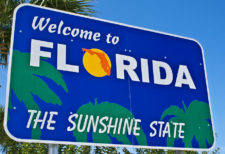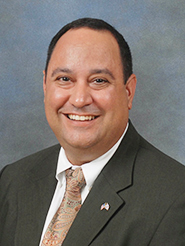


Last Thursday evening, the Florida legislature passed the most significant piece of public notice legislation in modern history.
Sen. Ray Rodrigues’ (R-Fort Myers) SB402 makes Florida the first state in the country to significantly dilute the statutory requirement that notices must be published in print newspapers. But there’s a lot for the newspaper industry and residents of the state to like about the bill.
It’s certainly an improvement over the alternative, Rep. Randy Fine’s (R-Palm Bay) HB35, which would have moved public notice in the state from newspapers to government websites. Fine’s bill had passed the House by the time SB402 started picking up steam in the Senate.
After the initial version of the Sen. Rodrigues’ bill met resistance, he worked with newspaper publishers in the state to craft the legislation that was eventually approved last week.
“Our approach was done in collaboration with the Florida Press Association and their members,” said Sen. Rodrigues in his brief presentation on the Senate floor (comments start at 1:26:40 of the video), contrasting his bill with Rep. Fine’s HB35. “And I believe that our approach accomplishes our goals and does it in a way that doesn’t harm any of our small newspapers, which are very important. And that is the difference between the two (bills).”
It’s clear from his comments that Sen. Rodrigues’ goal was to increase access to notices while driving down their cost for government purchasers.
What the bill does
SB402 authorizes state and local governments in Florida to publish most notices on newspaper websites in lieu of their print editions. Notices relating to property rights, like foreclosure and self-storage notices, must still be published in print.
Before they can move their notices to newspaper websites, though, government agencies must first hold a public hearing and determine whether there is sufficient broadband access in the area to ensure that “Internet-only publication of governmental agency notices would not unreasonably restrict public access” to the notices. Moreover, after an agency decides to move its notices to a local newspaper website, it still must publish a weekly notice in the print version of the paper informing readers that the notices can be accessed online.
SB402 also limits the fees newspapers can charge for website notices to no more than the same rate they would be able to charge under existing law if the ad had run in print. In a letter to FPA members after the bill passed, President Jim Fogler recommended that papers that publish an Internet-only notice on their website also run the notice at no extra cost in the print edition — a mirror image of the industry standard that has developed around the publication of print notices.
Balancing objectives
Proponents of SB402 laud its “free market” approach to public notice, which it seeks to achieve by allowing free-circulation newspapers to qualify to publish notices. “(B)y expanding competition we’re going to see governments paying less to post their legal notices because they are going to have more places they can go to … price shop and get a better deal for the taxpayers,” said Sen. Rodrigues on the Senate floor.

However, the emphasis on expanding the market to a wider range of newspapers was tempered by the objective of ensuring a sufficient readership for the notices. SB402 attempts to thread that needle by establishing new, more rigorous standards for newspapers to qualify to publish notices.
Those standards are likely to preclude some free-circulation papers from participating in the market and will even make it difficult for some newspapers that presently qualify to publish notices to continue doing so when the periodical-permit requirement sunsets in 2024.
Newspapers that qualify
To qualify under SB402, newspapers must have a combined print and online audience equalling at least 10 percent of the households in the county or municipality publishing the notice. In addition, at least 25 percent of the audited print editions must be delivered to homes or offices and the newspaper must also must be available for pickup in at least 10 public outlets in the region.
Newspapers must also be published for at least two years before they can qualify to publish notices, and no more than 75 percent of their content may be devoted to advertising. These requirements will keep “shoppers and fly-by-nighters from entering the market with virtually no readership or distribution and taking public notices out of legitimate publications with loyal readership,” Fogler told FPA members.
Rigorous disclosure
SB402 doesn’t deputize a public-notice police force to enforce these standards, but it does mandate the most rigorous disclosure requirements ever included in a public notice statute. The new law requires newspapers to publish information identifying their print auditor, an auditor’s statement verifying their print distribution and monthly unique visitors, and an ownership statement, within the first five pages of the paper and on the bottom of the home page of the website.
The bill gives a leg up to small papers by exempting newspapers in “fiscally-constrained counties” from having to meet the audience requirements as long as they maintain a periodical permit issued by the U.S. Postal Service. But even newspapers outside of those 30, mostly rural, counties, will have more than two years before their periodical permit will no longer qualify them to publish notices and they will be required to meet the 10 percent audience standard instead.
Role of the Florida Press Association
Another unusual aspect of SB402 is the outsized role it assigns to the Florida Press Association in the administration of the statute. It requires FPA to “ensure that minority populations throughout the state have equitable access” to notices posted on the statewide site and to publish quarterly reports identifying the newspapers that post notices on the site and their legal basis for doing so. The press group is also required to report the number of unique visitors to the statewide website, as well as the total number of notices published in print newspapers or exclusively online on newspaper websites.
Praise from a Senator
Sen. Jeff Brandes (R-St. Petersburg) fervently praised the bill. “It’s all great to say ‘I’ll just move (all notices) online and put everything on a website,’” he told his colleagues before the vote, explaining why newsprint is preferable to the internet for many kinds of notices. “But you miss out on the serendipity of the process when you do that.
“There are times where we have all kinds of real estate transactions that people just come across as they go through their local papers. And there are certain kinds of disclosures — for example, as it relates to storage units and other things — that nobody would ever go on a website and search for.”
But Sen. Brandes also defended the utility of internet notice. Contractors, for example, aren’t going to search every newspaper to “find out where their next job is going to be,” he said. “But they will search a website. So it’s striking the right balance. I think Sen. Rodrigues has done that in this bill.”
SB402 passed the Senate 39-0 on Thursday afternoon and was approved by the House later that evening by a vote of 105-9. Gov. Ron DeSantis is expected to sign the bill when it reaches his desk.
Key Features of Florida SB402
Highlights
• Government units may publish notices on newspaper websites in lieu of print newspapers
• Property-rights notices (foreclosure, etc.) still require print publication
• Expands eligibility to free-circulation newspapers and their websites
Eligibility Requirements
• Total audience must be at least 10% of households in jurisdiction
• At least 25 percent audited print circulation must be delivered
• Must also be available for pickup in at least 10 public outlets
• Papers in “fiscally constrained counties” exempt from above and current public notice newspapers grandfathered until Jan. 2024
• No more than 75% advertising
Disclosure Requirements
• Auditor statement verifying print circulation and web traffic, ownership statement and periodical permit (if applicable)
• Published on bottom of homepage and first five pages of newspaper
• For internet-only notice, agencies must place weekly ad in print version of paper promoting online access
• FPA must publish quarterly report identifying eligible papers and stating total number of print and online-only notices